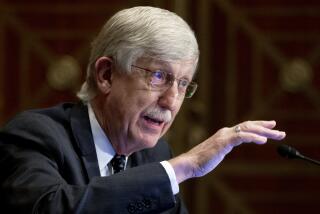Bush Given a Progress Report on AIDS : Health: President visits agency and says he is eager ‘to show a sense of caring.’ Top officials tell him more research and money are needed to fight disease.
- Share via
WASHINGTON — President Bush, apparently seeking to deflect attacks that he is indifferent to the AIDS epidemic, traveled to the Department of Health and Human Services Monday for an hourlong progress report from his top health officials on AIDS, and later asked: “What (more) do you think we ought to be doing?”
Bush, who has been making a visible effort in recent weeks to shore up his domestic agenda--where he is perceived to be politically vulnerable--praised the work of the federal government’s public health team and said that he is eager “to show a sense of caring” about AIDS “that Barbara and I feel as human beings.”
The President has been sensitive to criticism that he has ignored domestic policy in favor of foreign affairs and has made a series of highly publicized trips and speeches in the last month to concentrate on such issues as the economy, education and crime.
Moreover, AIDS activists, lawmakers and members of the National Commission on AIDS have charged him with being apathetic to the plight of those stricken with the deadly disease and have accused him of failing to provide strong leadership in dealing with the AIDS epidemic.
“We do want to help,” Bush told members of the commission, who also were present.
Commission members urged Bush to heed the more than two dozen recommendations made in a major report issued by the commission last fall that was harshly critical of the Bush and Ronald Reagan administrations. It attacked the White House for having “rarely broken its silence” on AIDS during the last decade.
The report called on the White House to develop a national plan to identify priorities and resources needed to prevent HIV transmission and to treat AIDS. The commission also recommended that a federal AIDS prevention initiative be developed and advocated universal health care coverage for everyone living in the United States.
Dr. June Osborn, chairman of the commission, told Bush that more research is needed on the sexual practices of young people--a pointed reference to a controversial study of teen-age sexual behavior canceled recently by the Bush Administration after pressure from political conservatives.
“We must not cripple ourselves by saying there are certain things we don’t want to ask because of ill taste,” she said.
In language considerably softer than that of the commission report, Osborn warned Bush that “we’ve got a bad decade coming” and told him that the epidemic has increased pressures “on a lot of our social structures that were a little shaky to begin with.” She said that AIDS was inextricably bound to other issues that should not be ignored--access to health care, drug abuse, housing and education.
Dr. Anthony S. Fauci, the government’s chief AIDS researcher, hinted that the National Institutes of Health could use more money but Bush did not--at least publicly--acknowledge the hint.
Fauci, director of AIDS activities for the NIH and director of its National Institute for Allergy and Infectious Diseases, requested that the White House ask Congress for $1.174 billion for the NIH’s AIDS activities for fiscal 1992, which began Oct. 1. Congress appropriated $874 million, which was a little less than the Administration request.
“We have had many successes,” Fauci told the President. “And our very successes in research generate additional challenges which in turn require additional resources.”
Bush, told how important prevention education was in changing behavior to reduce the risk of infection, asked: “Have we gotten our act together in getting the message out? What do we do to educate this country in terms of behavior?”
Fauci said that he has briefed the President on numerous other occasions, many of them private, at the White House and the NIH and several times at social occasions “where he has just taken me aside to ask what is going on.”
“This is not a onetime phenomenon, but reflects his ongoing interest in this very important problem,” Fauci added.
Osborn called Monday’s briefing “a very different thing from what’s ever happened before--and that’s good.”
More to Read
Sign up for Essential California
The most important California stories and recommendations in your inbox every morning.
You may occasionally receive promotional content from the Los Angeles Times.










